17 Researcher Resume Examples




A good researcher resume should include clear and concise sections on work experience, education, and relevant skills. The work experience section should detail specific roles, responsibilities, and achievements. The education section must list degrees obtained, schools attended, and relevant coursework or research. Skills should be relevant to the field of research and highlight technical proficiencies and specialized knowledge.
This resume includes detailed work experience with specific roles at a university, a media company, and a law office. It highlights tasks such as data analysis, document review, and legal research. The education section lists advanced degrees in biology from a reputable university. Skills listed are relevant to research, including data analysis and lab equipment proficiency. This demonstrates a strong background in both academic and practical research environments.

Phd researcher resumes should highlight research experience, technical skills, and academic achievements. They should list specific projects, methods used, and results obtained. Important sections include work history, education, skills, and publications. Clear and concise descriptions of roles and responsibilities are crucial.
This resume includes relevant information such as extensive research experience and specific techniques like CRISPR/Cas9 and SPSS. It details roles in data collection, analysis, mentoring students, and literature reviews. The resume also specifies the years of experience and institutions involved, providing a strong sense of the candidate's background.
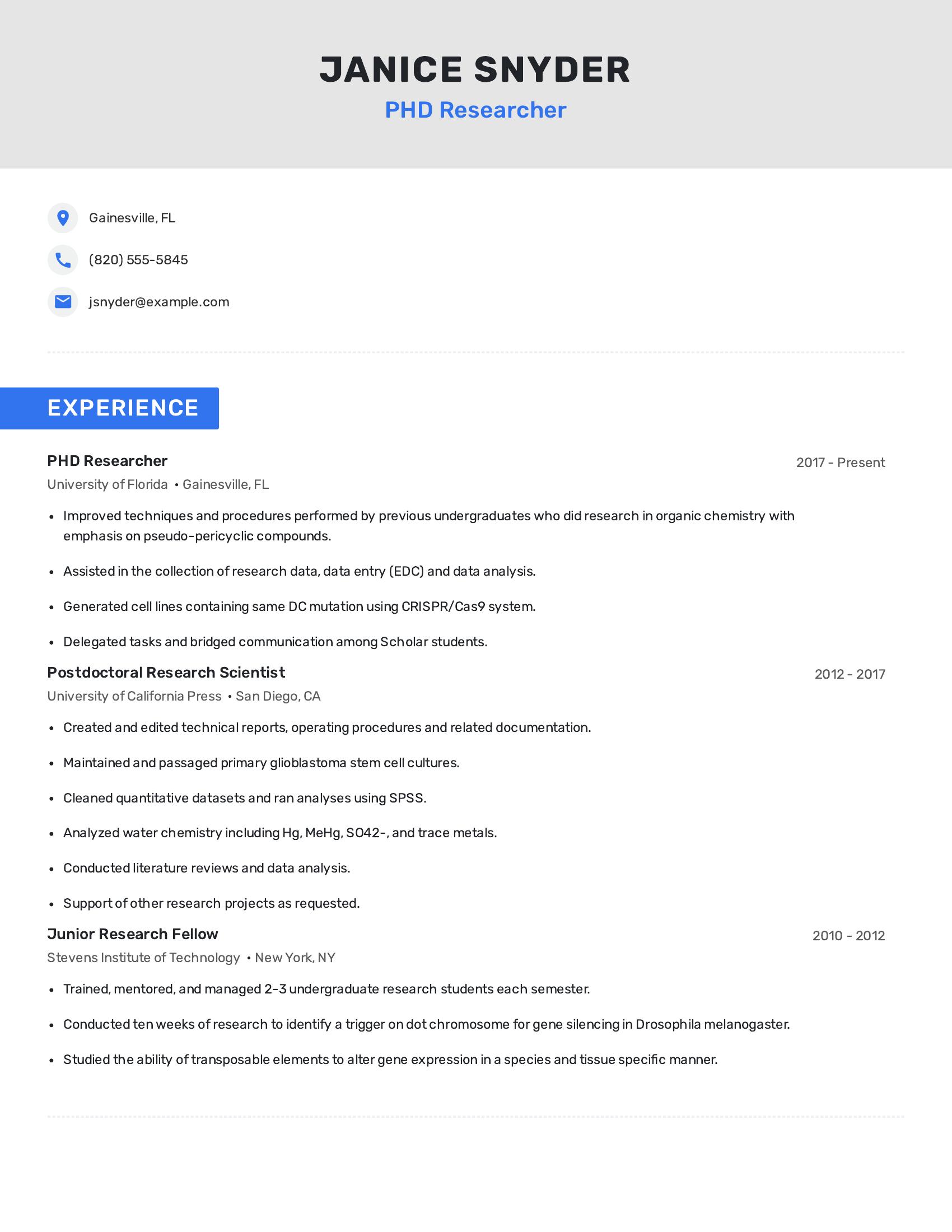
Post doctoral researchers need resumes that highlight their specialized skills, research experience, and academic background. A good resume for this role includes detailed employment history with specific research contributions, technical proficiencies, and relevant educational qualifications. It should clearly present the researcher's ability to handle lab equipment, conduct data analysis, and contribute to scientific literature. Additionally, it should demonstrate effective communication and teamwork skills.
This resume includes those specifics effectively. It lists the candidate's employment history with a focus on their research roles and responsibilities. The resume details technical skills such as molecular biology techniques and software proficiencies like SAS and ArcGIS. It also highlights the candidate's academic background with degrees in chemistry from reputable institutions. Moreover, it provides evidence of the candidate's ability to present research findings at conferences.
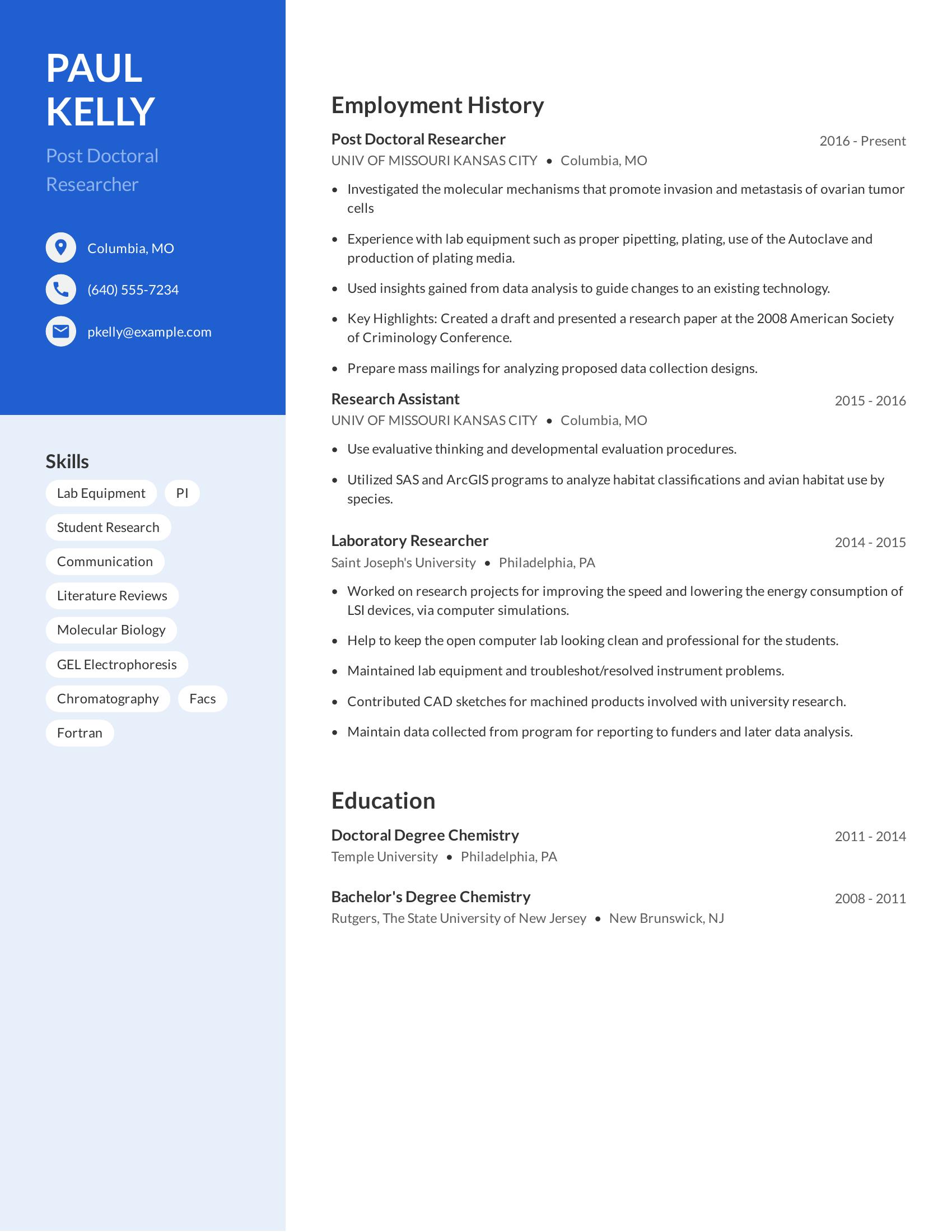
Graduate researcher resumes should include academic achievements, research experience, publications, and relevant skills. Highlighting specific projects and technical abilities is important. Details like collaboration efforts, independent research, and mentoring are valuable. Clear contact information and concise descriptions of past roles are also necessary.
This resume includes detailed research experience at universities, showcasing publications and technical skills in LC/MS, GC, and NMR characterization. It mentions collaboration with a catalysis group and independent research in food microbiology. It also highlights mentoring and professional development activities, demonstrating a well-rounded background.
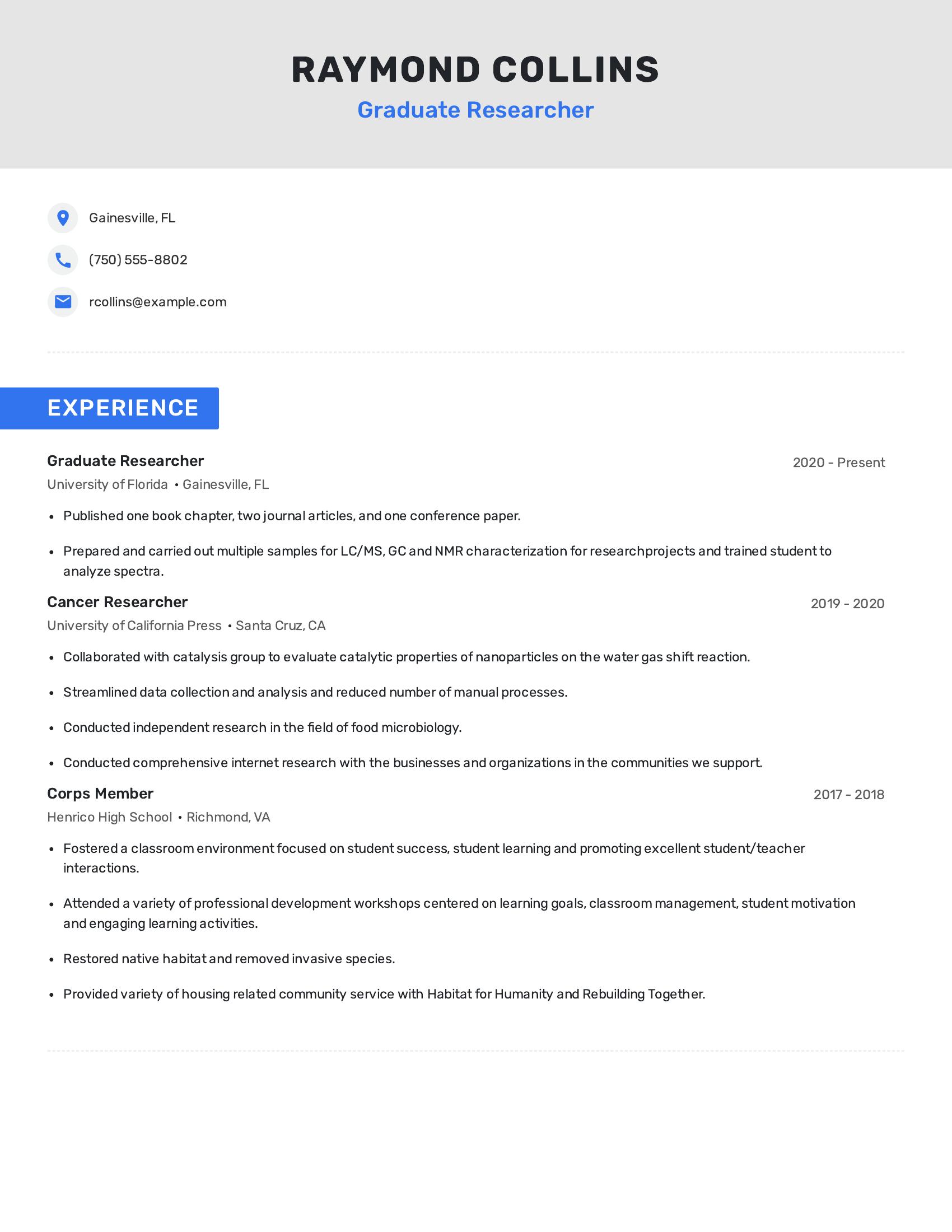
Laboratory researcher resumes should highlight experience in managing and conducting research projects. Key components include detailing specific roles, responsibilities, and achievements in past positions. Education background and relevant skills should be clearly listed to demonstrate expertise and qualifications in the field.
This resume includes comprehensive experience in supervising assistants, designing research projects, and obtaining funding. It lists various roles held at universities and an internship, showcasing a breadth of research involvement. The skills section is well-detailed, covering technical proficiencies like DNA research and cell culture, as well as soft skills such as communication. The education section outlines advanced degrees in biology, supporting the candidate's qualifications for laboratory research roles.
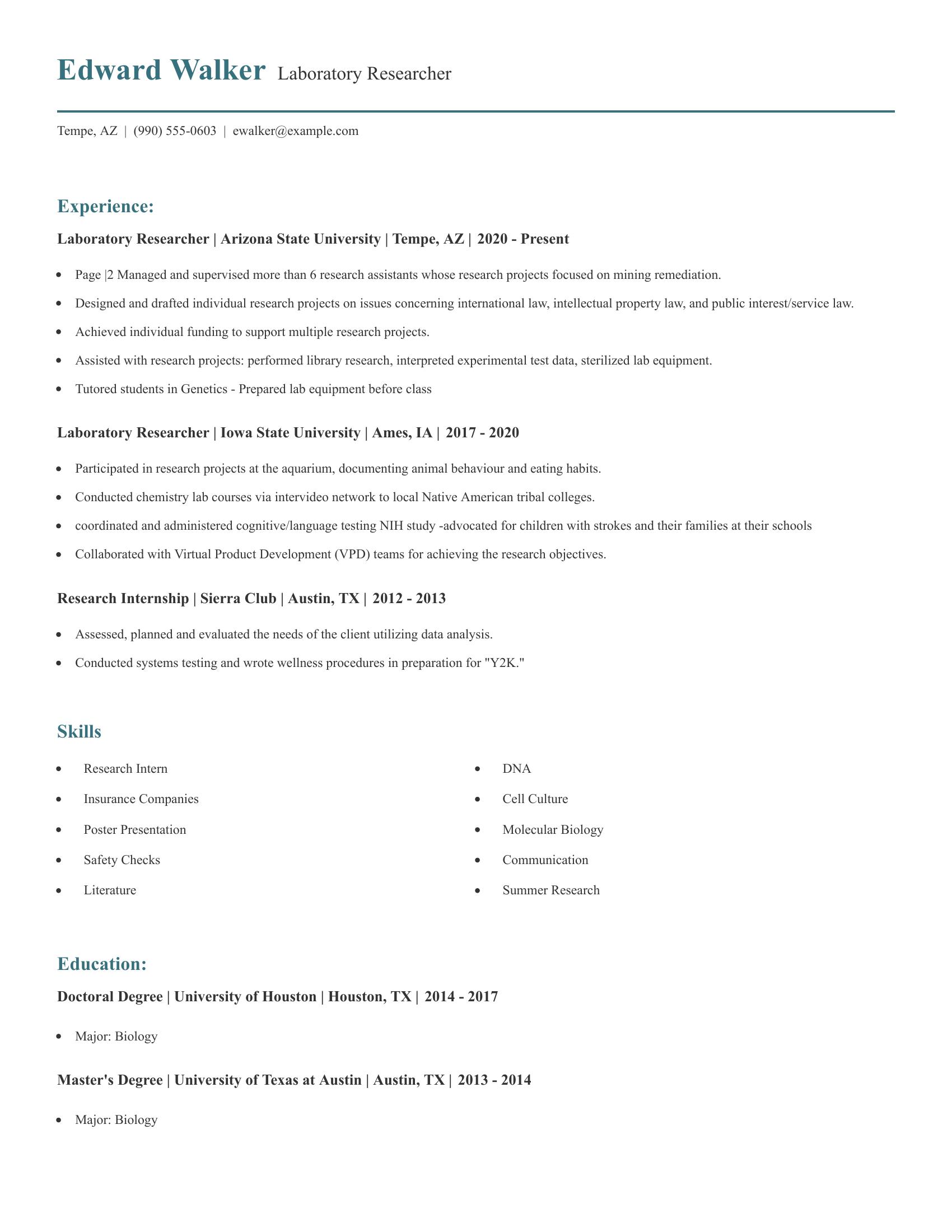
Cancer researcher resumes should highlight relevant experience, education, and skills. Experience should include specific research projects, data analysis, and any publications or presentations. The education section needs to list advanced degrees and relevant coursework. Skills should include lab techniques, software proficiency, and any specialized knowledge in cancer research.
this resume includes detailed job experience with specific tasks such as developing a correlation model and training new staff. It lists advanced education in biology and relevant skills like clinical trials and molecular biology. The resume also mentions software proficiency in Microsoft Office and experience with data collection and reporting.
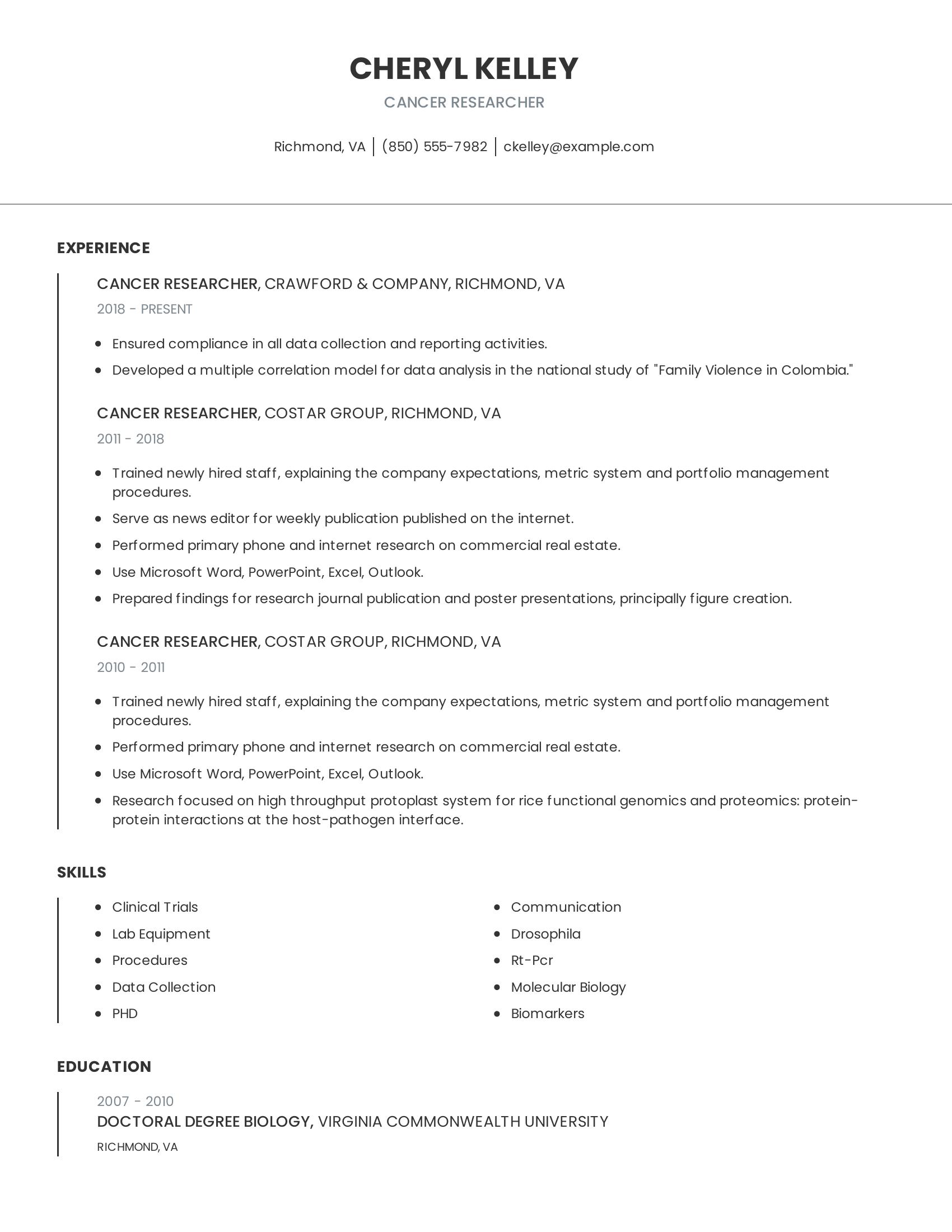
Graduate research student resumes should include clear sections for employment history, education, skills, and contact information. The employment history needs to list relevant positions with specific responsibilities and achievements. Education should detail degrees and institutions. Skills should highlight proficiencies that support research activities. A good resume is concise and relevant to the field of study.
This resume includes all necessary sections. employment history, education, skills, and contact information. It clearly lists job titles, institutions, responsibilities, and achievements. The education section details both master's and bachelor's degrees with institutions and dates. The skills section lists relevant research and technical proficiencies. Contact information is complete with location, phone number, and email address.
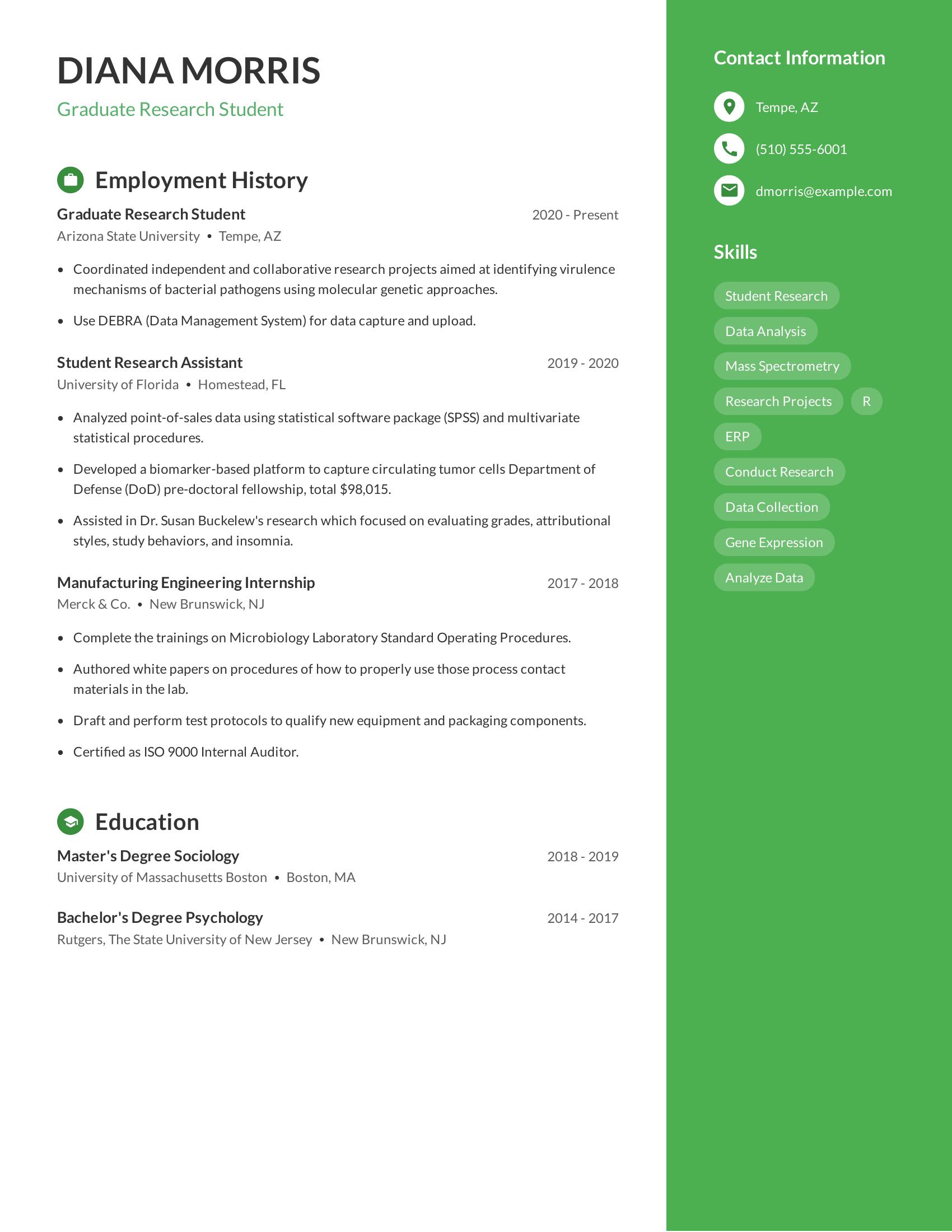
Research scholar resumes should include specific sections that highlight relevant skills, employment history, and education. Essential components are clear contact information, a concise skills list, detailed job descriptions with specific responsibilities and achievements, and educational background. The resume should focus on research experience, technical skills, and contributions to scientific projects or publications.
This resume includes all critical elements. It lists contact information, a variety of relevant skills like immunology, Stata, and clinical trials. Employment history details specific research roles with clear responsibilities and tasks. The education section provides a relevant degree in biology. This structure effectively showcases the candidate's qualifications for a research scholar position.
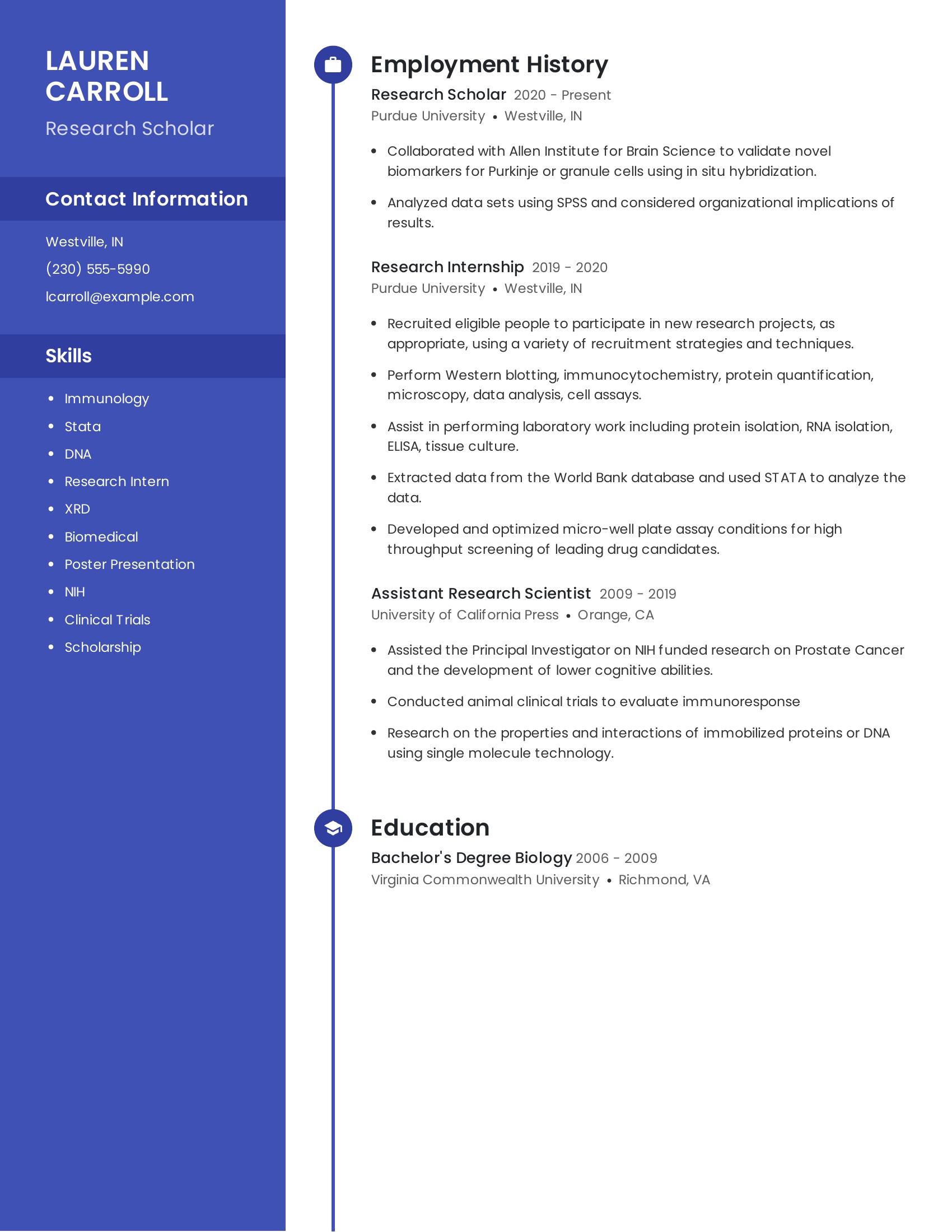
Visiting researcher resumes should highlight an individual's research experience, technical skills, and educational background. It should include previous research roles, specific projects undertaken, and relevant scientific techniques used. A good resume also lists skills pertinent to the field and outlines educational achievements. The focus should be on clear, concise descriptions of duties and accomplishments in each role.
This resume effectively includes these specifics by detailing the candidate's research experience at different universities, describing specific projects like wireless underwater communication and chemical isomerization reactions. It lists technical skills such as using XRD, XPS, SEM, and FT-IR techniques. The educational background is clearly stated with degrees in physics from a reputable university. Overall, it provides a comprehensive overview of relevant experiences and skills.
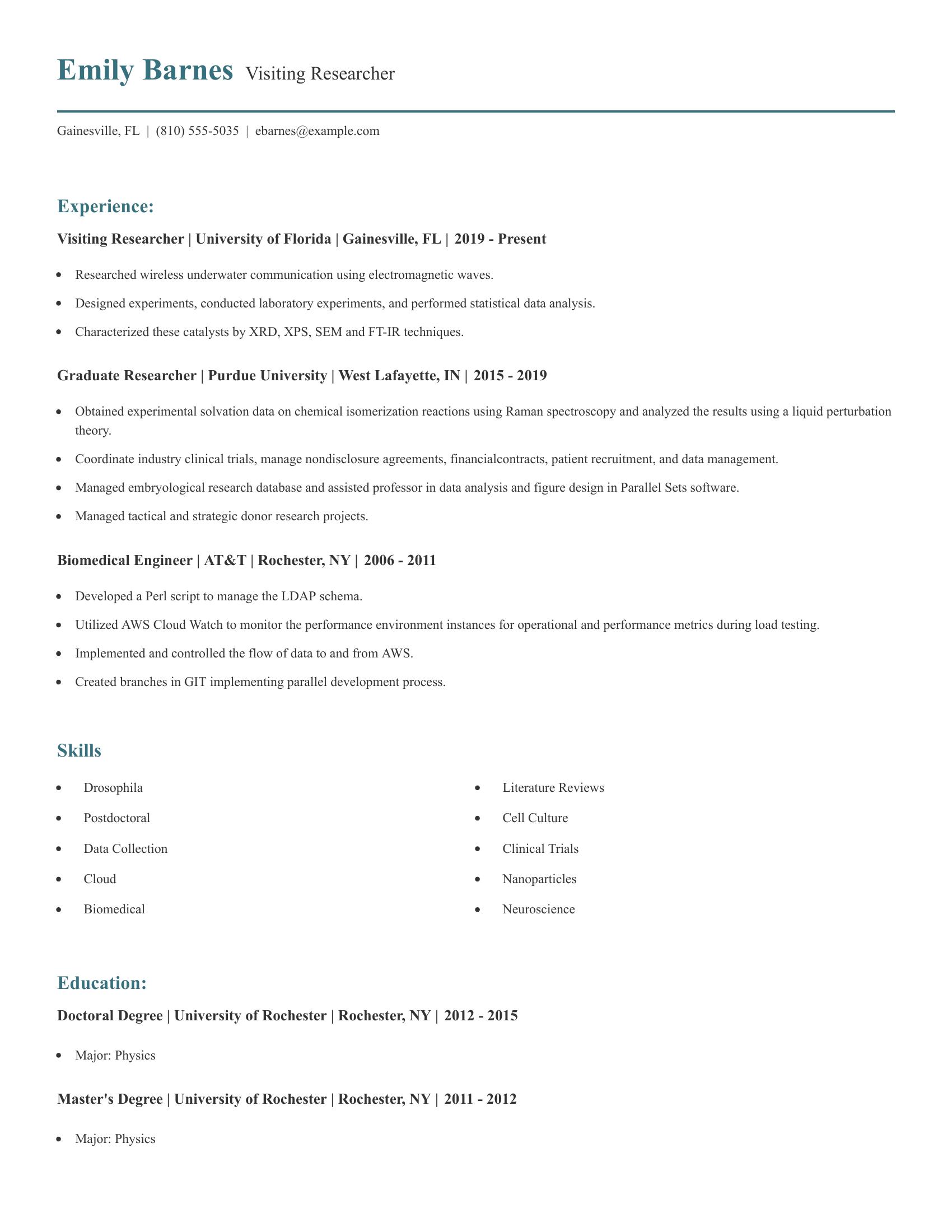
Research internship resumes should highlight relevant experience, skills, and education. It is important to list research projects, internships, and any specific tasks performed that demonstrate the candidate's hands-on experience. Skills related to data analysis, laboratory procedures, and technical proficiencies should also be included to showcase the candidate's qualifications.
This resume includes specifics such as data extraction, cleaning, and analysis tasks performed during a research internship at a university. It mentions experience with ISO 9001 quality management systems and process improvement methods from a laboratory internship. Additionally, it lists educational background in psychology, demonstrating the candidate's academic foundation. The resume effectively presents relevant experience and skills needed for a research internship role.
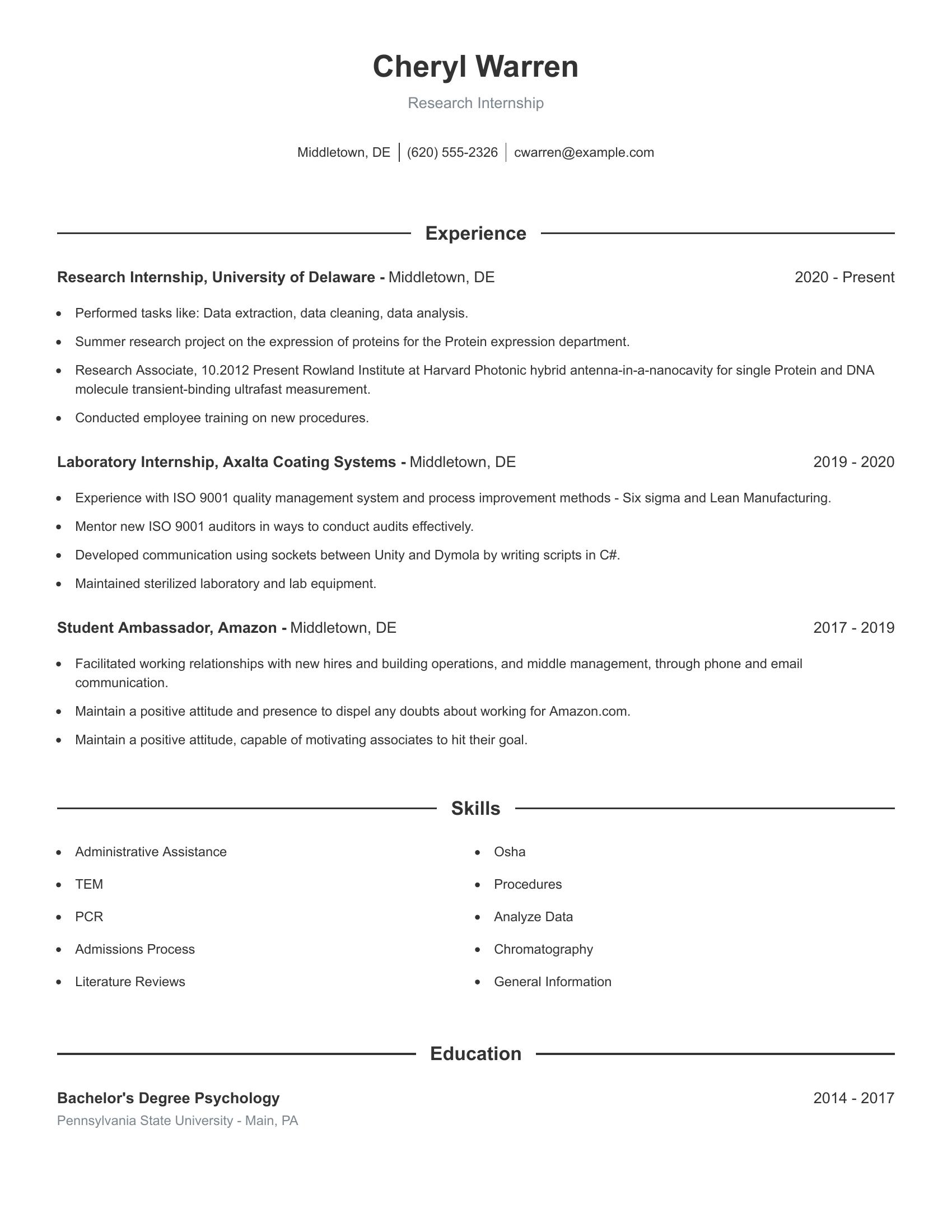
A research fellow resume should highlight the candidate's experience in conducting research, managing projects, and using advanced techniques and technologies. It should include past job titles, responsibilities, and achievements that demonstrate their expertise and contributions to their field. Additionally, the resume should present educational background and skills relevant to the research industry.
This resume includes specific job titles such as research fellow, research laboratory manager, and visiting researcher. It lists detailed responsibilities like conducting preclinical studies, extracting DNA and RNA, and evaluating new techniques for compound analysis. The resume also mentions skills such as mass spectrometry and PCR, along with an educational background in chemistry, making it a comprehensive representation of the candidate's qualifications.
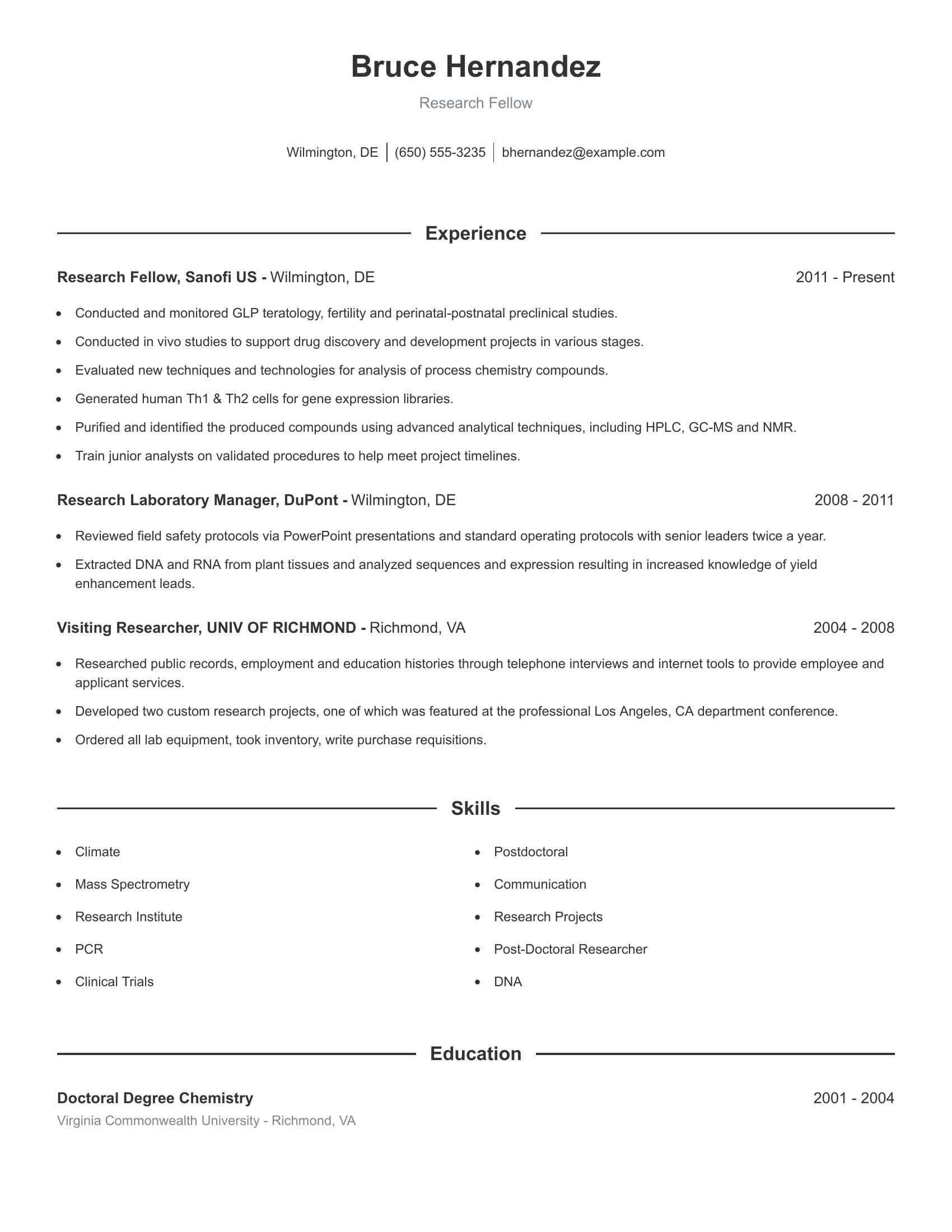
Postdoctoral scholar resumes should include detailed employment history, education background, contact information, and skills. They must highlight research experience, technical skills, and contributions to scientific advancements. Including specific duties and achievements in previous roles adds value.
This resume effectively includes detailed employment history with specific tasks and contributions. It outlines the educational background clearly. The skills section lists relevant competencies like RNA and data management. The contact information is straightforward, making it easy to reach the candidate.
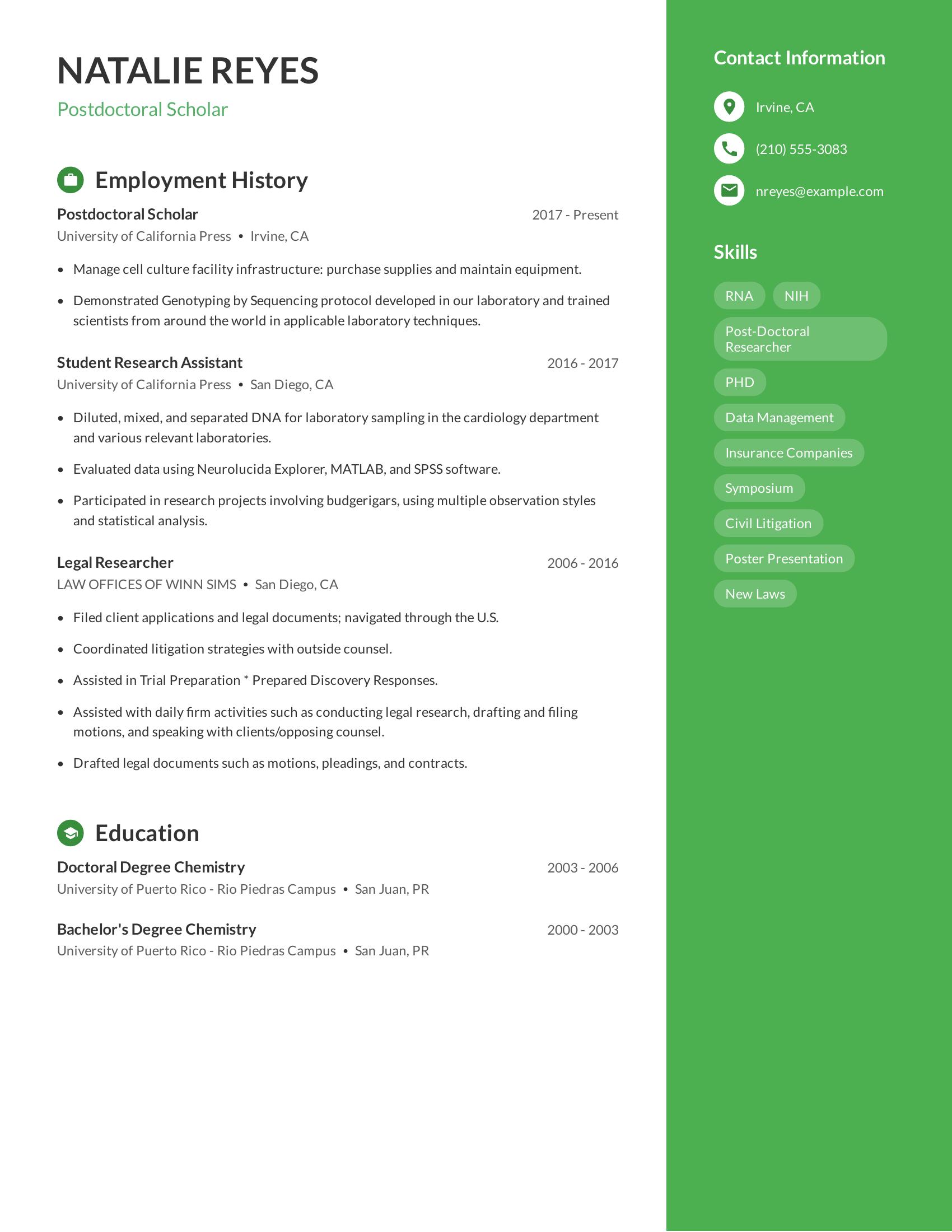
Assistant research scientist resumes should highlight relevant experience in scientific research, data management, and laboratory techniques. Key elements include job titles, specific tasks performed, skills acquired, and educational background. Experience in managing research projects, working with various types of cell cultures, and using specialized equipment should be clear. Additionally, demonstrating involvement in team projects and communication skills is important.
This resume effectively includes these specifics by detailing the candidate's experience at different institutions where they managed research projects and maintained cell cultures. It lists relevant skills like data collection, clinical trials, and gene sequencing. The educational background in biology supports the scientific roles held. The inclusion of previous investment banking experience also showcases the candidate's analytical skills and versatility.
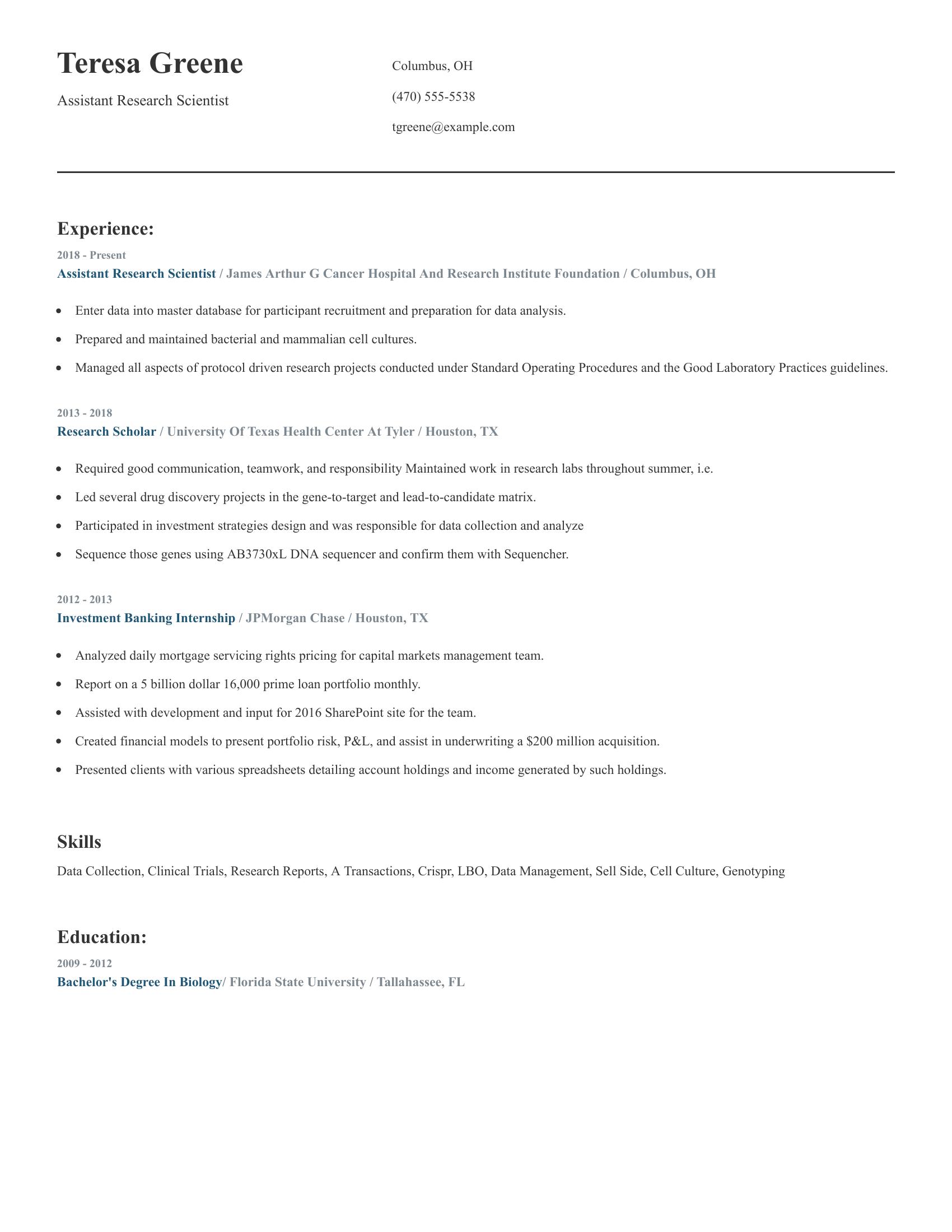
Senior research fellow resumes should highlight extensive research experience, expertise in specific scientific areas, and a record of published work. It should include relevant roles, responsibilities, and contributions to projects or institutions. Emphasis on collaboration with other researchers, teaching experience, development of new methods or technologies, and participation in committees or professional organizations is also important.
This resume includes detailed roles such as maintaining cell culture libraries and designing procedures for genomic sequencing assays. It shows versatility through previous positions like assistant professor and adjunct faculty, where responsibilities ranged from developing online resources to supervising clubs and committees. It also demonstrates collaboration skills through consulting on clinical trials and coordinating with team members at a hospital.
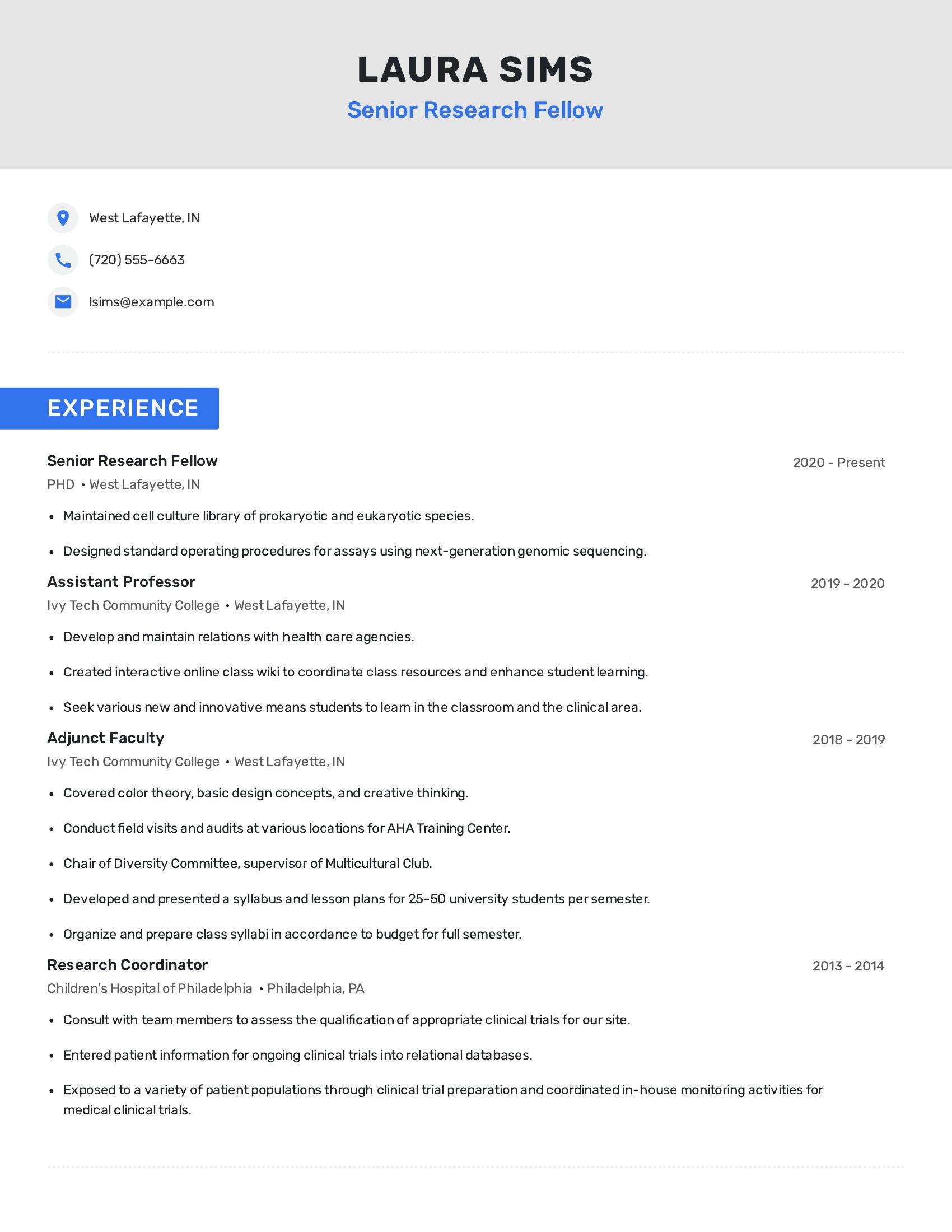
Research assistant resumes should highlight relevant skills, employment history, and education. Important skills include lab techniques, data analysis, and specific technical abilities like chromatography and DNA QC. Employment history should detail specific duties, contributions to projects, and tangible outcomes. Education should emphasize degrees related to the field of research.
This resume effectively includes these specifics. It lists skills like DNA QC, chromatography, and lab equipment use. The employment history provides clear details about duties and contributions to various research projects. The education section specifies a relevant degree and institution.
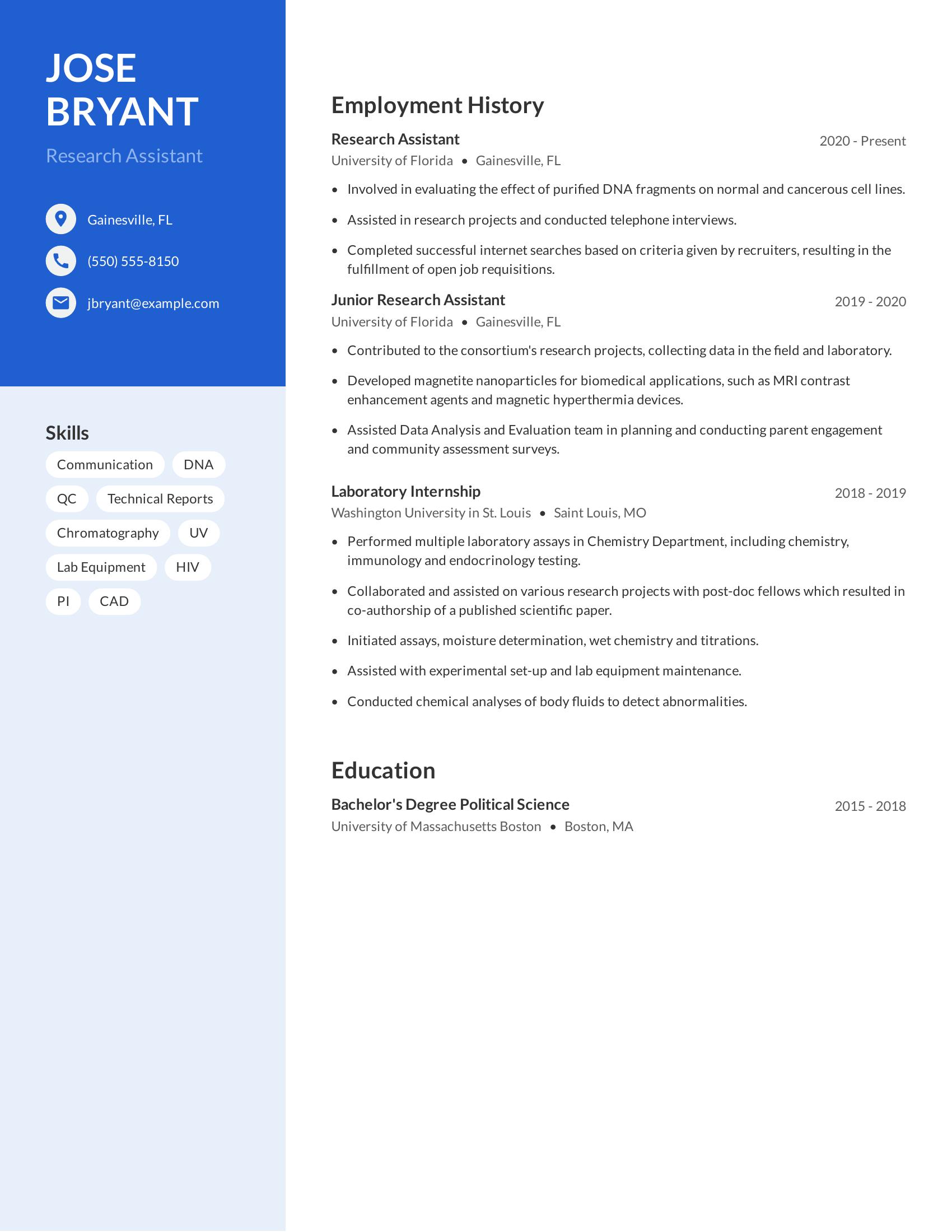
Student research assistant resumes should highlight relevant research experience, technical skills, and academic accomplishments. They should include clear job titles, the duration of each position, and the responsibilities held. Skills and experiences should be directly related to research tasks such as data analysis, laboratory techniques, and communication of findings through presentations or publications.
This resume effectively includes specific job titles and periods of employment for each role. It details responsibilities like conducting employee training, suggesting research opportunities, and maintaining cell cultures. The skills section lists relevant abilities such as PowerPoint proficiency and poster presentation preparation. However, the formatting could be improved for better readability.
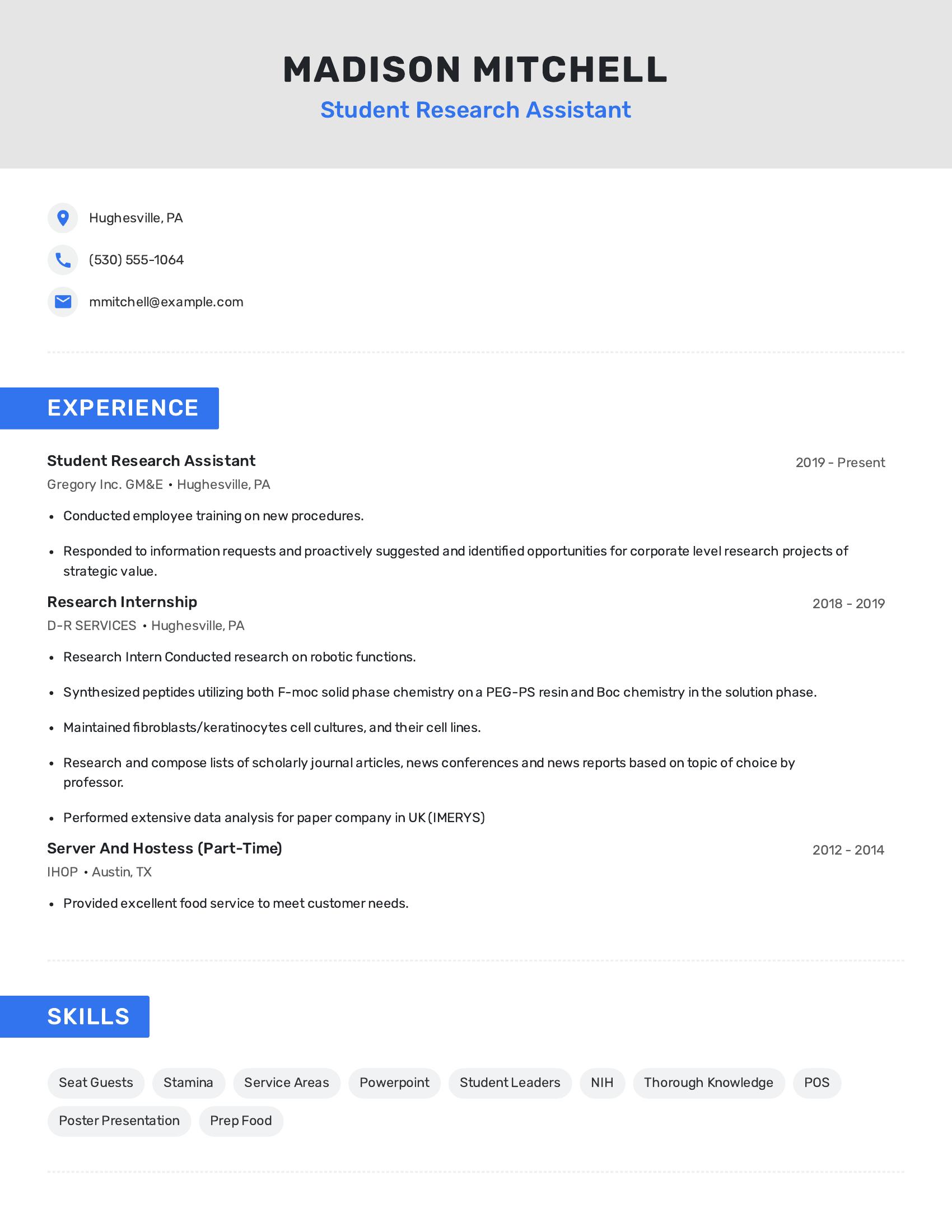
Summer research fellow resumes should highlight relevant skills, education, and employment history related to research. Important elements include specific research projects, data collection and analysis experience, and any grants or awards received. Skills pertinent to research, such as proficiency in tools like Python and techniques like cell culture, should be included. The resume should also demonstrate the ability to work independently and collaboratively in a research setting.
This resume includes relevant details like the awarded summer research grant and specific projects undertaken, such as the Heart Links Project. It lists relevant skills like data collection, Python, and cell culture. The employment history shows progressive research roles, from junior research scientist to summer research fellow, highlighting experience in data analysis and independent research. The inclusion of a biology degree aligns well with the job requirements.
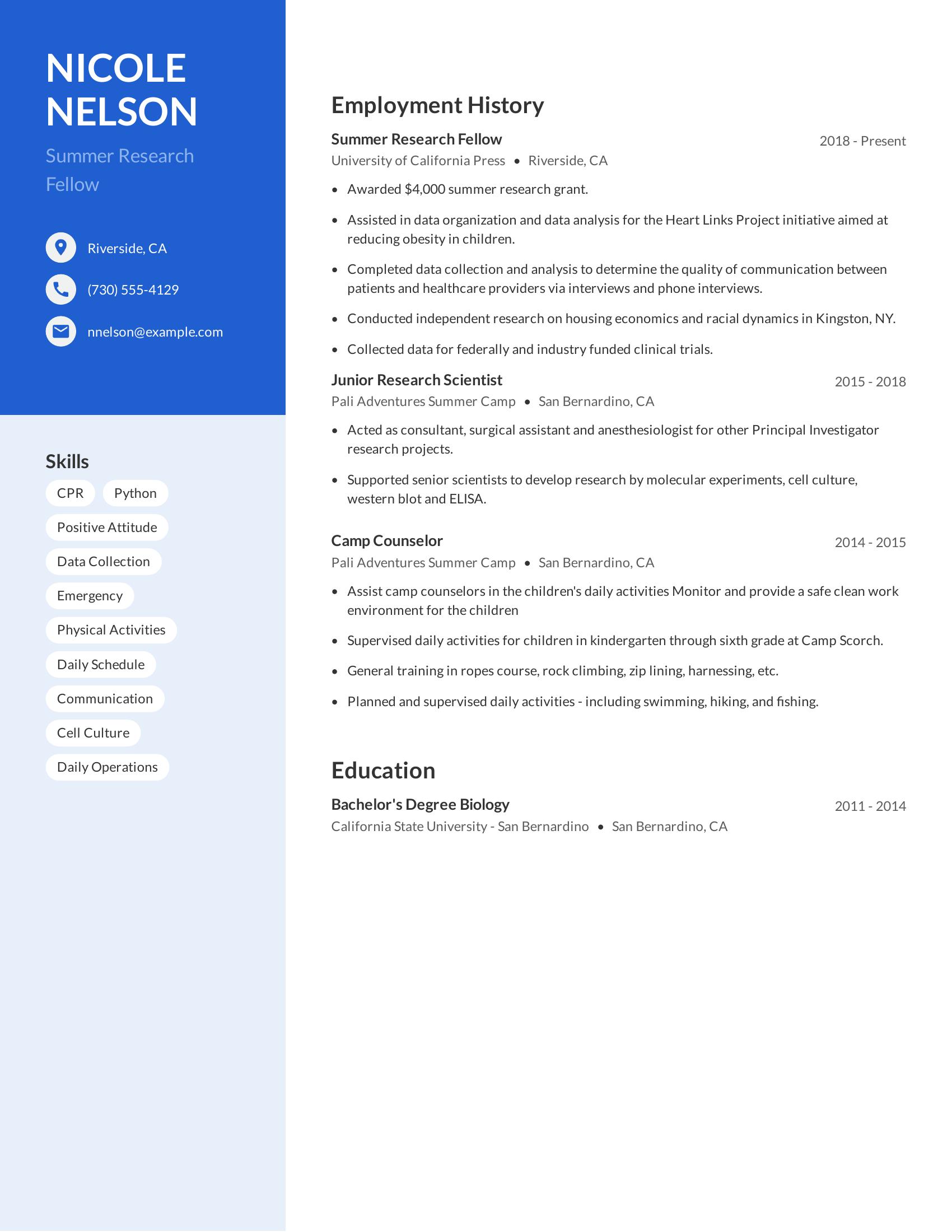
Research scientist resumes should highlight strong technical skills, relevant experience, and significant achievements. They should include clear sections for employment history, education, and skills. Each job entry should briefly describe responsibilities and accomplishments. Technical proficiencies and specific scientific methodologies used are essential details. The resume should also emphasize teamwork, leadership roles, and contributions to significant projects or research.
This resume includes detailed employment history with specific responsibilities and achievements. It mentions technical skills like DOE, data analysis, and lab equipment proficiency. The text shows leadership by describing team management and training roles. The educational background is clearly listed with relevant degrees. The resume effectively communicates the candidate's extensive experience in research and laboratory settings.
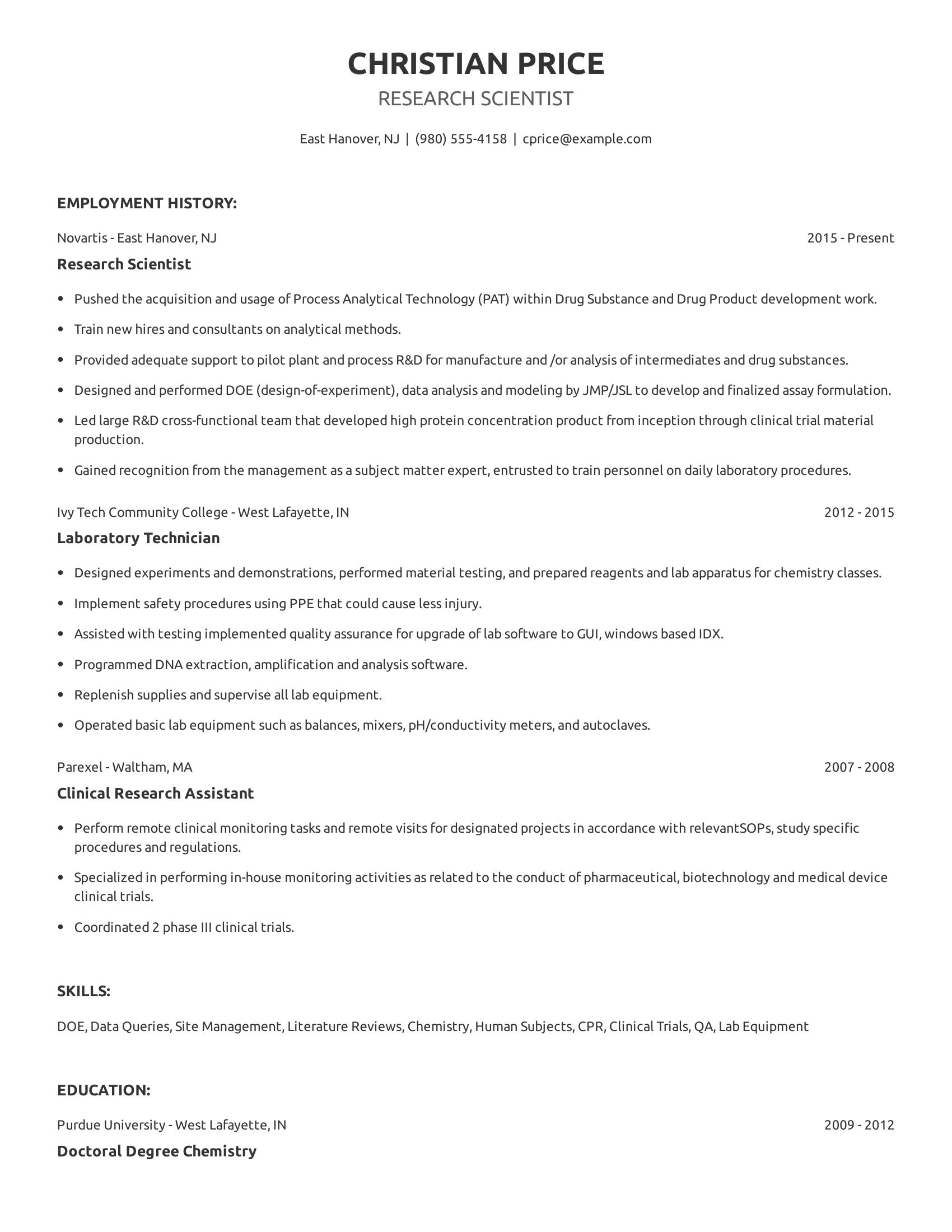
Highlight relevant research experience. Focus on specific projects, methodologies, and outcomes. Mention tools or software used, like SPSS or R.
Include publications and presentations. List articles in journals, conference papers, and poster sessions. Show your contributions to the field.
Showcase collaboration and teamwork. Mention work with other researchers, labs, or departments. Highlight joint projects and interdisciplinary studies.
A researcher's resume should showcase their skills and experiences in conducting experiments, analyzing data, and publishing results. Include contact information, a summary, work experience, education, skills, and publications.
A researcher summary should quickly highlight your skills, experience, and achievements. Focus on what makes you a good candidate for research positions.
Follow these tips to write an effective researcher summary. These practices help make your resume stand out.
A well-written researcher experience section needs to be clear and impactful. Focus on specific accomplishments and contributions. Highlight your role in projects and the methods you used.
Crafting a strong researcher experience section can set you apart. Follow these best practices for a compelling resume.
For a researcher, these hard skills are vital for success.
For a researcher, these soft skills are important for effectiveness.